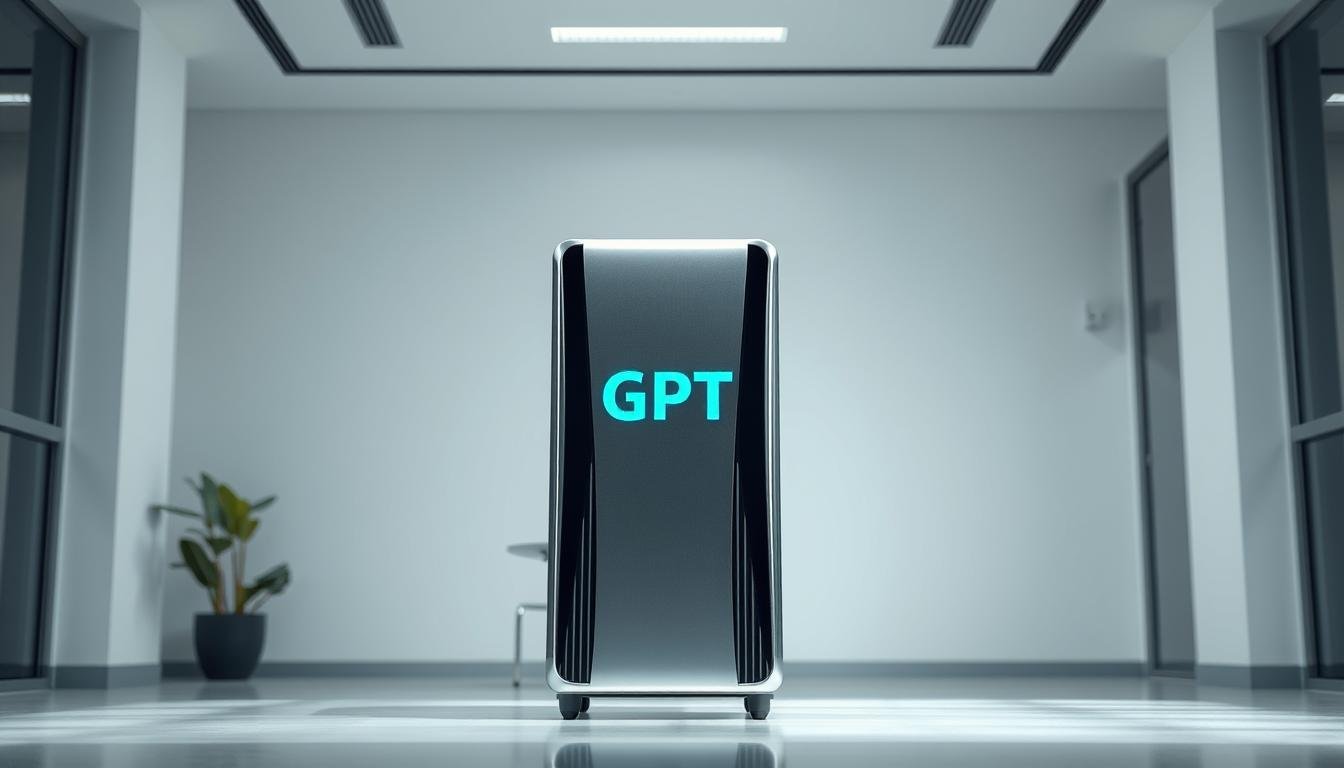Physical Address
304 North Cardinal St.
Dorchester Center, MA 02124
Physical Address
304 North Cardinal St.
Dorchester Center, MA 02124

As businesses continue to navigate the complexities of AI integration, the limitations of generic solutions like ChatGPT become increasingly apparent. While it’s a powerful tool, its one-size-fits-all approach can hinder its effectiveness in meeting specific business needs.
Adopting a custom-trained GPT model can be a game-changer, offering a tailored solution that aligns with your business objectives. This personalized approach enables companies to harness the full potential of AI, driving innovation and efficiency.
By moving beyond the constraints of standard AI models, businesses can unlock new opportunities and gain a strategic advantage in their respective markets.
As businesses continue to embrace digital transformation, the role of AI chatbots like ChatGPT is becoming increasingly pivotal. ChatGPT, developed by OpenAI, has been at the forefront of this transformation, leveraging natural language processing to enhance business-customer interactions.
Standard ChatGPT offers a range of capabilities that businesses can leverage today. These include:
These capabilities make ChatGPT a versatile tool for various business applications, from enhancing customer experience to streamlining internal processes.
One of the key advantages of ChatGPT is its ease of implementation. Businesses can integrate ChatGPT into their existing systems with relative ease, thanks to its user-friendly APIs and extensive documentation.
Despite its capabilities, off-the-shelf ChatGPT solutions have inherent limitations. One of the primary constraints is the knowledge base on which ChatGPT is trained. While it has been trained on a vast dataset, its understanding is limited to the data available up to a certain point in time.
Another limitation is the lack of industry-specific expertise. While ChatGPT can provide general information and support, it may not fully understand the nuances of specific industries or businesses.
| Capability | Standard ChatGPT | Custom-Trained GPT |
|---|---|---|
| Industry-Specific Knowledge | Limited | Highly Specialized |
| Training Data | General Dataset | Custom Dataset |
| Implementation Ease | Easy | More Complex |

Stop Using Generic AI. Start Building Your Competitive Advantage.
Schedule Your Free Strategy Session
Learn More About Our Process
Custom-trained GPT models represent a significant advancement in conversational AI, offering businesses a tailored approach to AI integration. Unlike standard models, custom-trained GPTs are developed with specific business needs in mind, allowing for more precise and relevant interactions.
The process of training a custom GPT model involves several key technical considerations. One of the primary decisions is whether to use a fine-tuning or pre-training approach. Fine-tuning involves adjusting a pre-existing GPT-3 model to fit specific business needs, while pre-training requires building a model from scratch using a custom dataset.
Fine-tuning is often faster and more cost-effective, as it leverages the existing capabilities of a pre-trained model like GPT-3. However, pre-training allows for a more tailored approach, potentially leading to better performance on highly specialized tasks. The choice between these approaches depends on the specific requirements of the business and the complexity of the tasks involved.
The quality and relevance of the training data are crucial for the success of a custom GPT model. High-quality data that is representative of the intended application is essential for achieving accurate and reliable results. Businesses must invest time and resources into curating and preparing their data to ensure the best possible outcomes.

Custom GPT models differ from standard models in several key ways. One of the most significant differences is the level of specialization versus generalization. While standard models are designed to handle a wide range of tasks, custom models are optimized for specific applications, leading to improved performance in those areas.
The specialization of custom GPT models allows businesses to achieve more accurate and relevant results in their specific use cases. This is particularly valuable in industries with unique terminology or complex processes.
Another critical difference is the level of control and ownership businesses have over custom GPT models. By developing a model in-house or in collaboration with a development partner, companies can maintain full ownership of their AI solutions, ensuring greater flexibility and control over their deployment and use.
Custom GPT implementation is not just about leveraging AI; it’s about creating a strategic asset that drives business success through precise alignment with company objectives. By tailoring a language model to meet specific business needs, organizations can unlock new levels of efficiency and innovation.
A custom-trained GPT model is designed with the company’s specific goals in mind, ensuring that the technology serves the business, not the other way around. This precise alignment enables businesses to address their unique challenges more effectively, driving progress towards their objectives. For instance, a company focused on customer service can train its GPT to handle inquiries more efficiently, improving response times and customer satisfaction.
One of the key advantages of custom GPT models is their ability to be trained on a company’s proprietary data, incorporating its specific knowledge and expertise. This integration enhances the model’s capabilities, making it a valuable asset for the organization. By leveraging its own data, a business can create a GPT that provides insights and solutions tailored to its specific market and customer base.
By implementing a custom GPT model, businesses can achieve a sustainable competitive advantage. This is because the model is tailored to the company’s unique strengths and market position, enabling it to offer services and solutions that are difficult for competitors to replicate. The table below highlights the key differences in how custom GPT models can drive competitive advantage.
| Feature | Standard GPT | Custom GPT |
|---|---|---|
| Training Data | General Data | Proprietary Business Data |
| Business Alignment | Limited | Highly Aligned with Business Objectives |
| Competitive Advantage | Limited Differentiation | Significant Sustainable Advantage |
Ready to Transform Your Operations, Delight Your Customers, and Leave competitors Behind?
Build Our Custom GPT Now
See Case Studies of Our Success →

Enterprise operations are being transformed through the adoption of custom ChatGPT, enhancing both customer experience and internal knowledge management. This transformation is multifaceted, impacting various aspects of business operations.
Custom ChatGPT models significantly enhance customer experience by providing personalized interactions at scale. This is achieved through:

The implementation of custom ChatGPT revolutionizes internal knowledge management by democratizing expertise access and streamlining information retrieval. Key benefits include:
Custom ChatGPT accelerates product development by providing data-driven insights and enhancing collaboration among development teams. This leads to faster innovation cycles and more competitive product offerings.
By integrating custom ChatGPT into their operations, enterprises can achieve significant improvements in customer satisfaction, operational efficiency, and product innovation.
The integration of custom GPT models into business operations brings with it a range of security and compliance benefits that are crucial for modern enterprises. As companies navigate the complexities of AI adoption, ensuring the security and integrity of their data and operations becomes paramount.

Custom GPT solutions offer businesses enhanced data privacy control and governance. By tailoring the GPT model to their specific needs, companies can ensure that sensitive information is handled in accordance with their internal policies and external regulatory requirements. This includes implementing robust data encryption, access controls, and data retention policies.
One of the key advantages of custom GPT solutions is their ability to facilitate regulatory compliance management. Businesses can configure their GPT models to adhere to relevant laws and regulations, such as GDPR, HIPAA, or CCPA, thereby reducing the risk of non-compliance and associated penalties. Custom GPT models can be updated regularly to reflect changes in regulatory landscapes.
Custom GPT solutions also provide robust intellectual property protection. By training GPT models on proprietary data, businesses can safeguard their intellectual assets while leveraging AI for innovation. This is particularly important in industries where intellectual property is a key differentiator.
In conclusion, custom GPT solutions offer a trifecta of benefits in terms of data privacy, regulatory compliance, and intellectual property protection, making them an attractive option for businesses seeking to harness the power of AI while maintaining stringent security and compliance standards.
Deploying a custom GPT model requires a well-planned implementation roadmap. This roadmap is crucial for ensuring that the deployment process is smooth, efficient, and aligned with business objectives.
A robust technical infrastructure is the backbone of any successful custom GPT deployment. This includes high-performance computing resources, scalable storage solutions, and advanced security measures to protect sensitive data. Businesses must assess their current infrastructure and identify any necessary upgrades or modifications to support the demands of a custom GPT model.

Effective data collection and preparation are critical for training a custom GPT model. This involves identifying relevant data sources, developing a data cleansing protocol, and implementing a data labeling process. A well-structured data strategy ensures that the GPT model is trained on high-quality, relevant data, enhancing its performance and accuracy.
Seamless integration with existing business systems is vital for maximizing the benefits of a custom GPT model. This includes integrating with customer relationship management (CRM) systems, enterprise resource planning (ERP) systems, and other relevant business applications. Key considerations include:
API development is a critical aspect of integrating a custom GPT model with existing business systems. It requires careful planning to ensure secure, efficient data exchange between systems. APIs must be designed to handle the specific data requirements of the GPT model, while also complying with relevant data protection regulations.
The user interface (UI) design plays a crucial role in the adoption and effectiveness of a custom GPT model. The UI should be intuitive, user-friendly, and tailored to the specific needs of the business and its users. A well-designed UI enhances the overall user experience, encouraging adoption and maximizing the benefits of the GPT model.
| Implementation Aspect | Description | Key Considerations |
|---|---|---|
| Technical Infrastructure | High-performance computing and storage | Scalability, security, performance |
| Data Collection | Identifying and preparing relevant data | Data quality, relevance, labeling |
| System Integration | Integrating with CRM, ERP, and other systems | API development, UI design, change management |
The decision to invest in a custom-trained GPT model requires a thorough cost-benefit analysis. Businesses must weigh the initial development costs against the potential long-term benefits and return on investment (ROI).

The cost of developing and training a custom GPT model can vary significantly based on factors such as the complexity of the model, the amount of data to be processed, and the expertise required. Initial investment includes data collection, infrastructure setup, and training costs. Companies should also consider the cost of integrating the GPT model with their existing systems.
After the initial deployment, custom GPT models require ongoing maintenance to ensure they remain effective and accurate. This includes regular updates to the training data, monitoring performance, and making necessary adjustments. Allocating resources for continuous maintenance is crucial for maximizing the model’s benefits.
To justify the investment in custom GPT models, businesses need to measure their ROI and overall business impact. This involves both quantitative and qualitative assessments.
Quantitative metrics include cost savings, revenue generated, and efficiency improvements. For instance, a custom GPT model that automates customer service can reduce operational costs and improve customer satisfaction.
Qualitative benefits encompass enhanced customer experience, improved decision-making capabilities, and competitive advantage. By leveraging custom GPT models, businesses can gain deeper insights into their operations and market trends, enabling more informed strategic decisions.
As highlighted by industry experts, “AI investments like custom GPT models are not just about cost savings; they’re about creating new revenue streams and driving business growth.”
“The future of AI is not just in the technology itself, but in how it transforms business models and creates new opportunities.”
The impact of custom GPT is being felt across various industries, with early adopters sharing their success stories. As businesses continue to explore the potential of AI, these real-world examples provide valuable insights into the transformative power of custom GPT models.
A leading financial services firm implemented a custom GPT model to enhance customer support and streamline operations. By integrating their proprietary knowledge base into the GPT, they achieved a significant reduction in response times and improved the accuracy of their customer interactions. The custom GPT model was able to handle a wide range of queries, from simple account inquiries to complex financial product explanations.

A mid-sized healthcare provider adopted a custom GPT solution to manage their vast repository of medical knowledge and patient data. The GPT model was trained on their specific datasets, enabling it to provide precise and relevant information to healthcare professionals. This implementation resulted in improved patient care and more efficient knowledge sharing among staff.
| Industry | Application | Benefits |
|---|---|---|
| Financial Services | Customer Support | Reduced response times, Improved accuracy |
| Healthcare | Knowledge Management | Improved patient care, Efficient knowledge sharing |
Early adopters of custom GPT models have learned the importance of aligning AI capabilities with specific business objectives. They emphasize the need for high-quality training data and continuous updating to ensure the model remains relevant and effective. Moreover, integrating custom GPT with existing systems and processes is crucial for maximizing its potential benefits.
By examining these case studies, businesses can gain a deeper understanding of how custom GPT can drive innovation and efficiency in their own operations.
A well-crafted custom GPT strategy is pivotal for businesses aiming to leverage AI for competitive advantage. This involves a multi-step process that begins with understanding your business needs and extends to the implementation and monitoring of the solution.
The first step in developing your custom GPT strategy is to identify high-value use cases. These are areas where AI can significantly impact your business operations or customer interactions. Prioritize use cases that align closely with your strategic objectives and have the potential for substantial ROI.
Once you’ve identified your use cases, the next step is to select the right development partners and resources. This involves evaluating potential vendors based on their expertise in GPT technology, their understanding of your industry, and their ability to integrate with your existing systems.
A phased implementation plan is crucial for managing the rollout of your custom GPT solution effectively. This involves:
When creating your implementation plan, it’s essential to balance quick wins with long-term projects. Quick wins can provide immediate value and help build momentum, while long-term projects may offer more substantial benefits over time.
To ensure the success of your custom GPT strategy, it’s vital to measure performance at each stage of implementation. This involves setting clear KPIs and regularly assessing progress against these metrics.
As businesses navigate today’s rapidly evolving landscape, future-proofing their operations is crucial for long-term success. Custom AI solutions, particularly custom-trained GPT models, offer a strategic advantage in achieving this goal. By aligning AI capabilities with specific business objectives, companies can drive innovation, enhance customer experiences, and streamline internal processes.
The adoption of custom AI not only fosters a competitive advantage but also enables businesses to stay ahead of the curve. With the ability to integrate proprietary knowledge and expertise into AI models, organizations can differentiate themselves from competitors and respond more effectively to market changes.
To leverage the full potential of custom AI, businesses must identify high-value use cases, select the right development partners, and create a phased implementation plan. By doing so, they can ensure a successful integration of custom AI solutions, ultimately securing their competitive future and driving sustainable growth in an increasingly complex business environment.